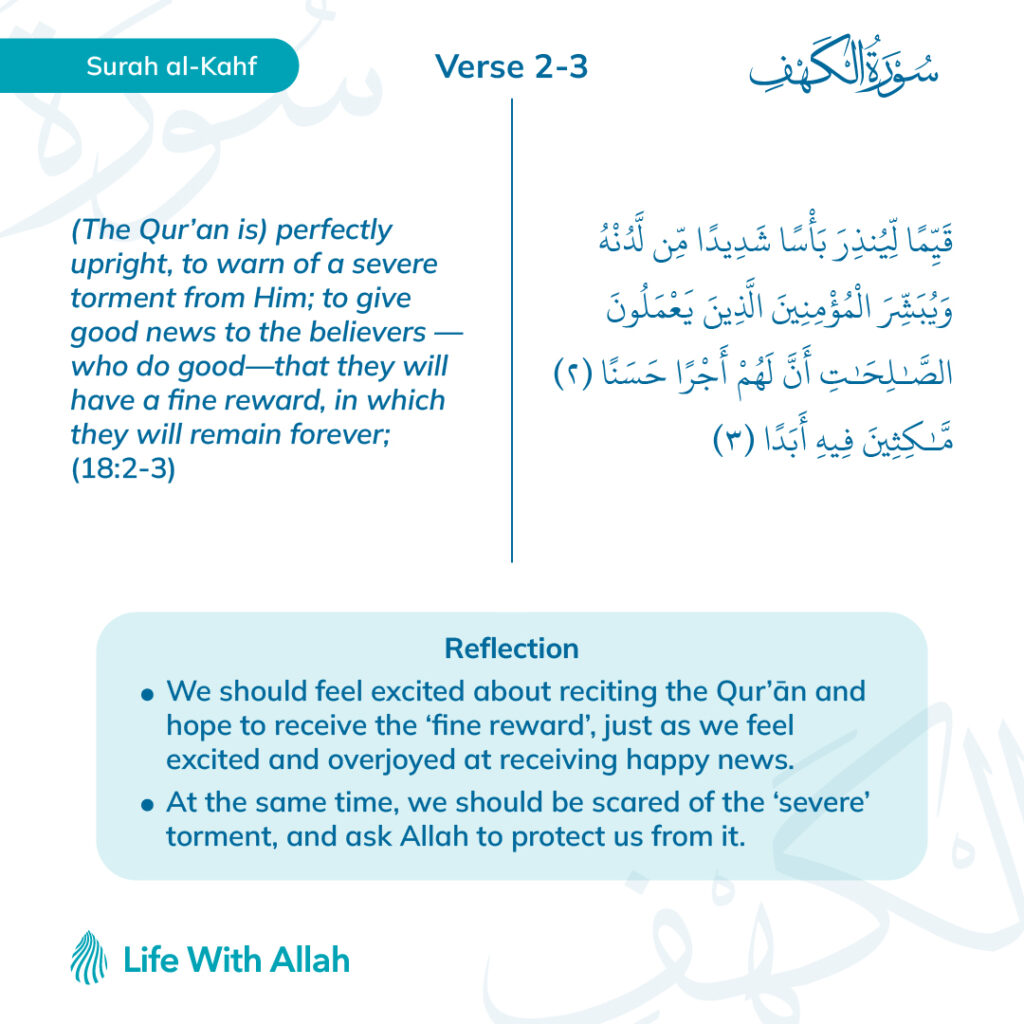There was once a wealthy man from the Banū Isrā’īl who had indulged in sin throughout his life. When his death was near, he instructed his children to burn him after his death, crush his bones, and scatter his ashes on a windy day by the sea. After he died, his children did just as he asked. Allah then gathered his ashes together and asked him, “What made you do that?” The man replied, “Fear of you.” And so Allah forgave him (Bukhārī).
Our relationship with Allah is characterised primarily by three emotions: fear, love and hope. Fear (khawf) is an integral part of īmān. Allah says, “…So do not fear them, but fear Me if you are (true) believers” (3:175). Allah (subḥānahū wa taʿālā) praises the Prophets: “…They used to race towards the good deeds and invoke us with hope and fear; and they were humbly submissive to us” (21:90).
“The heart in its journey to Allah is like a bird. Love is its head, and fear and hope are its two wings. When the head is healthy, then the two wings will fly well. When the head is cut off, the bird will die. When either of the two wings is damaged, the bird becomes vulnerable to every hunter and predator.” – Ibn al-Qayyim (raḥimahullāh)
Ibn Rajab (raḥimahullāh) writes, “Allah created His creation so that they would know Him, worship Him and fear Him. He established proofs which show His greatness and magnificence so that they fear Him and are in awe of His majesty. He described to them His severe punishment and the place of torment prepared for those who disobey Him, so that they protect themselves with good deeds. For this reason, Allah (ʿazza wa jall) repeatedly mentions the Hell-fire in His Book and the torment in it, including al-Zaqqūm (a tree whose fruits will burn the stomachs of the inhabitants of Hell-fire), poisonous thorny plants, boiling water, chains, shackles and many other horrific things.”
He further explains that it was the fear of Allah, and awe and humility in front of Him, which raised the Companions and the Pious Predecessors to such lofty ranks, to the extent that not only did they abstain from the ḥarām (forbidden), but also from the makrūh (disliked).
Say, “The (true) losers are those who will lose themselves and their families on Judgment Day. That is indeed the ultimate loss.” Above them there shall be layers of fire, and layers of fire shall be beneath them. In this way Allah strikes fear into His servants’ hearts: ‘My servants! Fear Me!’ (39:15-6)
Khashyah: Being in Awe of Allah
The fear of Allah is unique to other types of fears. In life, you tend to run away from things you fear. For example, anyone who is scared of spiders or rodents will freeze or run upon seeing them. However, fearing Allah (subḥānahū wa taʿālā) is unique and beautiful. It makes you run to Him, and not away from Him. The more you fear Him, the more you turn to Him.
A fear of worldly matters is usually accompanied with a dislike of it. However, the fear of Allah is coupled with love and respect for Him, since you are in awe of Him.
Although Allah is beyond all worldly examples, think of an elderly grandfather or an older person who is well-respected. As soon as he enters the room, everyone falls quiet out of respect for him. The silence is not because he is a tyrant of the household; rather, it is because of the respect that his family accords him. This type of fear is known as haybah or khashyah, a reverential type of fear.
It is this emotion that the senior Companion ʿAmr b. al-ʿĀṣ (raḍiy Allāhu ʿanhu) felt when he was in the presence of the Messenger of Allah ﷺ. He said even though the Prophet ﷺ was the most beloved of people to him, he could not describe him. This is because whenever he was in his company, he was unable to look directly at his blessed face. He would lower his head and humbly gaze downwards, out of deep respect and awe.
Fāṭimah b. ʿAbd al-Malik was asked about the worship of her legendary husband, the Caliph ʿUmar b. ʿAbd al-ʿAzīz after his death. She replied, “By Allah, he was not the one who prayed or fasted the most amongst the people. But, by Allah, I have not seen anyone more fearful of Allah than him. He would remember Allah in his bed and would twitch like a sparrow out of fear, until we would say that in the morning, the people will no longer have a caliph (i.e. he would die by morning).”
Knowing Allah: The Path to Fearing Him
The fear of Allah (subḥānahū wa taʿālā) is not an irrational fear. It is a fear built on knowledge. The more you get to know Him, the more you fear Him. You are in constant awe of His majesty, greatness and power. Allah says, “Of all of Allah’s servants, only the knowledgeable (of His might) are truly in awe of Him” (35:28).
Our beloved Prophet ﷺ knew Allah the most and hence he feared Him the most. He ﷺ said, “Indeed I see what you do not see. The sky is creaking and it has every right to creak: there is not even the space of four fingers (in the sky), except that there is an angel who has lowered his head in prostration to Allah. By Allah, if you knew what I know, you would laugh little and weep much; you would not enjoy intimacy with women; and you would certainly go out in the wildernesses, earnestly supplicating to Allah” (Tirmidhī).
Likewise, Jibrīl (ʿalayhis-salām) was unique in his fear of Allah. When the Prophet ﷺ saw Jibrīl in his original form, he had 600 wings, and his huge size filled the horizon between the sky and the earth. He is the best of angels, who was tasked with the most prestigious responsibility of transmitting the word of Allah. And yet, despite his physical and spiritual greatness, the Prophet ﷺ saw him on the Night of Miʿrāj (ascension) looking like “a worn-out piece of cloth due to the fear of Allah” (Ṭabarānī). Jibrīl’s knowledge of Allah’s majesty and greatness reduced him to this state.
There are two categories of people who fear Allah: (1) the general people who fear the punishment of the world and the hereafter (grave, Hell-fire etc.); (2) the elite who are acquainted with Allah through His Names, and thus fear Allah Himself due to His greatness, grandeur, power and magnificence. This does not mean that they do not share the fears of the first category, but their fear and awe of Allah Himself outweighs the fear of His punishment. In other words, they are scared of being distanced from Him and of there being a barrier (ḥijāb) in between them.
Ibn al-Qayyim (raḥimahullāh) writes, “The fear of the lover is the greatest of fears” as he fears “falling from the eyes of the beloved, and being rejected by, distanced from, or veiled from Him.”
Those who recognise Allah and appreciate His greatness and majesty, will always fear that their deeds are not good enough. They always fear that their deeds will not be accepted, due to their deficiencies. Allah says,
والَّذِينَ يُؤْتُونَ مَا آتَوْا وَقُلُوبُهُمْ وَجِلَةٌ
And those who give that which they give with their hearts full of fear… (23:60)
The Messenger of Allah ﷺ said, “…They are those who fast, perform salāh, give charity while they fear that their Lord will not accept it from them…” (Tirmidhī).
Fear: A Deterrent
Today, we witness so many earthquakes, floods, volcanoes, hurricanes and other disasters, but, unfortunately, we do not learn from these frightening incidents. We remain immersed in sin and fail to repent. Allah sends us minor punishments in this world to remind us to repent and turn back to Him. He says, “And We do not send signs except to frighten” (17:59). Similarly, the Prophet ﷺ said that the sun and the moon do not eclipse due to the death of a person, but “Allah frightens His servants with it” (Bukhārī).
Another example of this is the COVID-19 pandemic. How many of us increased in our fear and awe of Allah because of it? How many of us were humbled, and turned back to Allah?
Contrast this with our beloved Prophet ﷺ. His blessed face would change when he would see a cloud or a strong wind approaching. He would go out, and pace back and forth, out of worry. He was asked by his wife the reason for his actions and why he did not see it as positive sign of rain, like others did. He ﷺ explained that he was scared it may bring with it punishment, just as the previous nations were punished.
Thus, the fear of Allah should be a deterrent, which leads us to stop sinning. Allah says,
وَلِمَنْ خَافَ مَقَامَ رَبِّهِ جَنَّتَانِ
But for he who fears the standing before his Lord, there will be two gardens (i.e. in paradise).” (55:46)
Mujāhid (raḥimahullāh) says regarding this verse: “It refers to a person who, when he intends to sin, remembers the standing before his Lord and stops himself from committing the sin.”
“When fear resides in the hearts, it burns away the sources of lust and eradicates worldly attachments.” Ibrāhīm b. Sufyān (raḥimahullāh)
How to Cultivate the Fear of Allah in Your Heart
1. Reflect on Allah’s greatness and might
We should reflect regularly on Allah’s greatness by reflecting on His Names. This will create a greater fear of Him. Allah is The All-Powerful (al-Qadīr), The All-Dominant (al-Qahhār), The Compeller (al-Jabbār), The Supreme (al-ʿAẓīm); nothing can overcome Him. If He wished, He could destroy the heavens and the earth in an instant.
Likewise, we should reflect on His creation to help us appreciate His power and might. Reflecting on the beauty, harmony and vastness of the earth, solar system and the heavens will help us appreciate Allah’s greatness. Our awe of Him will increase further when we recall the Day of Judgement, a day upon in which the whole earth will be in a single grip of Allah’s Hand, and the heavens will be rolled up in His Right Hand. Ibn ʿAbbās (radiy Allāhu ʿanhumā) said, “The seven skies and earths are not in the Hand of The Most Merciful, except like a mustard seed in one of your hands.”
2. Reflect on the Qur’ān (tadabbur)
Reciting and reflecting on verses about the Hell-fire, the destruction of the previous nations, and about the greatness of Allah, will all help to increase our fear of Allah.
“By Allah, if an intelligent believer recited Sūrah al-Ḥadīd, the end of Sūrah al-Ḥashr, Āyah al-Kursī, and Sūrah al-Ikhlāṣ with deep thought and contemplation, his heart would burst open out of the awe of Allah, and he would be baffled by His greatness.” Ibn al-Jawzī (raḥimahullāh)
3. Reflect on the hereafter and its various stages
We should reflect on the gravity of standing before Allah, the terrors of the grave, the horrors of the Day of Judgement, the sharpness of the ṣirāṭ and the torment of the Hell-fire. A practical means to do this is to visit the graveyard and ponder on all of the above.
When ʿUthmān (raḍiy Allāhu ʿanhu) would stop at a grave, he would cry until his beard was soaked (in tears). It was said to him, “Paradise and Hell-fire are mentioned, and you do not cry, yet you cry because of this?” So he replied “The Messenger of Allah ﷺ said: ‘Indeed the grave is the first stage of the hereafter. Whoever is saved from )the punishment of the grave), then what will follow it will be easier. And whoever is not saved from it, then what will follow it will be worse.’” He said, “And the Messenger of Allah ﷺ said, ‘I have not seen anything more horrible than the grave’” (Ibn Mājah).
4. Reflect on your sins and their consequences
We should think about how much we have disobeyed Allah. We should feel scared that we may not get a chance to repent before we die, and that we may not be forgiven. We should reflect on how little we have prepared for our journey to the hereafter, and feel very scared.
Similarly, we should fear the consequences of sins, especially a bad ending. When death approached Sufyān al-Thawrī (raḥimahullāh), he began to cry. A man said to him, “Abū ʿAbdilllāh, (are you crying) due to excessive sins?” He replied, “No. Rather, I am scared that my īmān will be taken away from me.”
5. Ask Allah to grant you awe of Him
Our beloved Prophet ﷺ would ask Allah:
اَللّٰهُمَّ وَأَسْأَلُكَ خَشْيَتَكَ فِي الْغَيْبِ وَالشَّهَادَةِ…
“O Allah, I ask You for Your fear in private and in public…” (Nasā’ī).
The Positive Outcomes of Fear
1. Fear makes you do good deeds
Allah says, “(Are they better) or those who worship devoutly in the hours of the night, prostrating and standing, fearing the Hereafter and hoping for the mercy of their Lord?” (39:9).
“The origin of all goodness in the world and the hereafter is the fear of Allah, Exalted and Majestic is He. Every heart that does not contain the fear of Allah is a heart which is ruined.” – Abū Sulaymān al-Dārānī (raḥimahullāh)
2. Fear allows you to benefit from reminders
Allah (ʿazza wa jall) says, “But you [O Prophet] can only warn those who fear their Lord, though they cannot see Him…” (35:18).
3. No fear in the hereafter
In a ḥadīth qudsī, Allah says, “By My glory, I will not combine two fears nor two assurances for My slave: if he feared Me in the world, I will grant him safety on the Day of Judgement. And if he felt safe from Me in the world, I will make him fear Me on the Day of Judgement” (Ibn Ḥibbān).
4. Shade on the Day of Judgement
Amongst the seven categories of people who will be granted shade on the Day of Judgement, one will be “a man who was invited to (commit zinā) by a noble, wealthy woman, but he said, ‘I fear Allah’” and another will be “a man who remembered Allah whilst he was alone and he cried” (Bukhārī).
5. Freedom from Hell-fire
The Messenger of Allah ﷺ said, “A man who wept out of the fear of Allah shall not enter the Fire until the milk returns to the udder [i.e. an impossibility]” (Tirmidhī).
6. Paradise
Allah (ʿazza wa jall) says, “And as for those who feared standing before their Lord and restrained themselves from (evil) desires, Paradise will certainly be (their) home” (79:40-1).
7. Allah will be happy with you
Allah (ʿazza wa jall) says, “Allah is pleased with them and they are pleased with Him. This is (only) for those in awe of their Lord” (98:8)
Fear is not an end, but it is the means to an end. When the residents of Paradise will enter Paradise, their love for Allah will multiply, but their fear will come to an end, and they will be told,
ٱدْخُلُوا۟ ٱلْجَنَّةَ لَا خَوْفٌ عَلَيْكُمْ وَلَآ أَنتُمْ تَحْزَنُونَ
“Enter Paradise! There will be no fear for you, nor will you grieve” (7:49).






